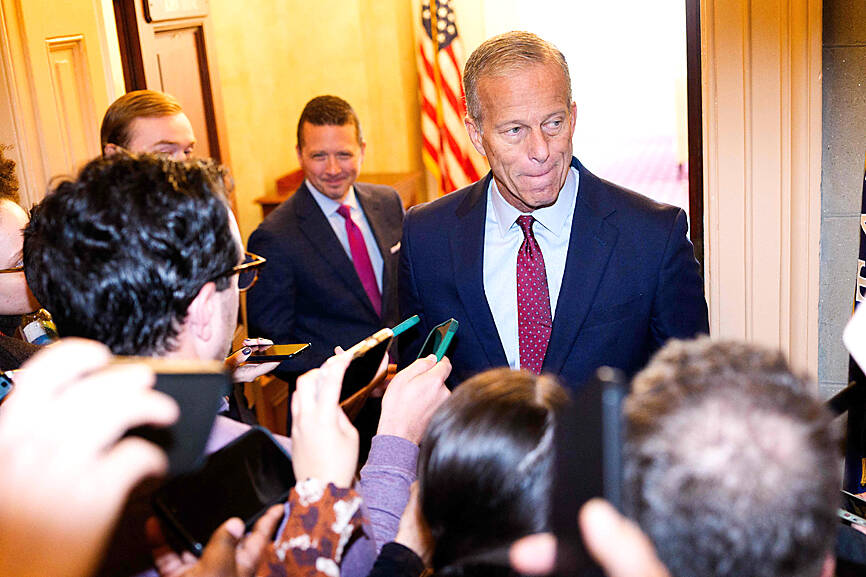The US government shutdown stretched into its 40th day yesterday even as senators stayed in Washington for a grueling weekend session hoping to find an end to the funding fight that has disrupted flights nationwide, threatened food assistance for millions of Americans and left federal workers without pay.
The US Senate has so far shown few signs of progress over a weekend that could be crucial for the shutdown fight. Republican leaders are hoping to hold votes on a new package of bills that would reopen the government into January while also approving full-year funding for several parts of government, but the necessary Democratic support for that effort was far from guaranteed.
“We’re only a handful of votes away” from passing a bill to reopen the government, Senate Majority Leader John Thune said on Saturday.

Photo: Getty Images via AFP
Still, Democratic leaders are pushing hard for an extension of subsidies for health plans offered under the Affordable Care Act. Republicans have rejected that offer, but signaled openness to an emerging proposal from a small group of moderate Democrats to end the shutdown in exchange for a later vote on the “Obamacare” subsidies, which make coverage more affordable.
For those enrolled in Affordable Care Act exchanges, premiums are on average expected to more than double next year if the US Congress allows the enhanced subsidies to lapse.
Senator Bernie Sanders said the pledge to hold a vote on extending the healthcare subsidies would be a “wasteful gesture” unless “you have the commitment of the speaker of the House that he will support it and that the president of the United States will sign it.”
US President Donald Trump has made clear he is unlikely to compromise any time soon. He pressed Republicans again over the weekend to get rid of the Senate’s filibuster rules that prevent the chamber from advancing on most legislation unless there is support from 60 senators.
Democrat Senator Jeanne Shaheen and others, negotiating among themselves and with some rank-and-file Republicans, have been discussing bills that would pay for parts of government — food aid, veterans programs and the legislative branch, among other things — and extend funding for everything else until next month or January. The agreement would only come with the promise of a future healthcare vote, rather than a guarantee of extended subsidies.
It was unclear whether enough Democrats would support such a plan. Even with a deal, Trump appears unlikely to support an extension of the health benefits. House Speaker Mike Johnson also last week said that he would not commit to a health vote.
Republican leaders only need five additional votes to fund the government, and the group involved in the talks has ranged from 10 to 12 Democratic senators.
Some Republicans have said they are open to extending the COVID-19 pandemic-era tax credits, as premiums could skyrocket for millions of people, but they want new limits on who can receive the subsidies. They lined up on Saturday to take to the Senate floor and argue that subsidies for the plans should be routed through individuals.
“We’re going to replace this broken system with something that is actually better for the consumer,” Senator Lindsey Graham said.
Trump wants Republicans to end the shutdown quickly and scrap the filibuster so they can bypass Democrats altogether. US Vice President JD Vance endorsed the idea on social media on Saturday, saying Republicans who want to keep the filibuster are “wrong.”
Republicans have rejected Trump’s call, and Thune is eyeing a bipartisan package that mirrors the proposal the moderate Democrats have been sketching out. What Thune, who has refused to negotiate, might promise on healthcare is unknown.
The package would replace the House-passed legislation that the Democrats have rejected 14 times since the shutdown began Oct. 1. The current bill would only extend government funding until Nov. 21.
A test vote on new legislation could come in the next few days if Thune decides to move forward.

James Watson — the Nobel laureate co-credited with the pivotal discovery of DNA’s double-helix structure, but whose career was later tainted by his repeated racist remarks — has died, his former lab said on Friday. He was 97. The eminent biologist died on Thursday in hospice care on Long Island in New York, announced the Cold Spring Harbor Laboratory, where he was based for much of his career. Watson became among the 20th century’s most storied scientists for his 1953 breakthrough discovery of the double helix with researcher partner Francis Crick. Along with Crick and Maurice Wilkins, he shared the

China’s Shenzhou-20 crewed spacecraft has delayed its return mission to Earth after the vessel was possibly hit by tiny bits of space debris, the country’s human spaceflight agency said yesterday, an unusual situation that could disrupt the operation of the country’s space station Tiangong. An impact analysis and risk assessment are underway, the China Manned Space Agency (CMSA) said in a statement, without providing a new schedule for the return mission, which was originally set to land in northern China yesterday. The delay highlights the danger to space travel posed by increasing amounts of debris, such as discarded launch vehicles or vessel

RUBBER STAMP? The latest legislative session was the most productive in the number of bills passed, but critics attributed it to a lack of dissenting voices On their last day at work, Hong Kong’s lawmakers — the first batch chosen under Beijing’s mantra of “patriots administering Hong Kong” — posed for group pictures, celebrating a job well done after four years of opposition-free politics. However, despite their smiles, about one-third of the Legislative Council will not seek another term in next month’s election, with the self-described non-establishment figure Tik Chi-yuen (狄志遠) being among those bowing out. “It used to be that [the legislature] had the benefit of free expression... Now it is more uniform. There are multiple voices, but they are not diverse enough,” Tik said, comparing it

TOWERING FIGURE: To Republicans she was emblematic of the excesses of the liberal elite, but lawmakers admired her ability to corral her caucus through difficult votes Nancy Pelosi, a towering figure in US politics, a leading foe of US President Donald Trump and the first woman to serve as US House of Representatives speaker, on Thursday announced that she would step down at the next election. Admired as a master strategist with a no-nonsense leadership style that delivered for her party, the 85-year-old Democrat shepherded historic legislation through the US Congress as she navigated a bitter partisan divide. In later years, she was a fierce adversary of Trump, twice leading his impeachment and stunning Washington in 2020 when she ripped up a copy of his speech to the